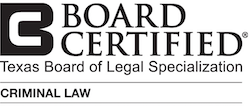Expunction and Record Sealing Attorney
Expunctions: Information on Clearing Your Record
If you have a prior criminal record you may not be aware that you have the option of legally clearing it. This process is known as either an expunction or a non-disclosure. Which one may be available to you depends upon the disposition of your case. To be eligible for an expunction, you must have either received a dismissal, an acquittal, or as a result of an arrest which was occurred, but was never filed by information (for a misdemeanor) or by indictment (for a felony). Both may be options and could be available to you for any number of crimes from misdemeanors to felonies which can help legally clear your record, and in some instances, allow you to legally deny the incident ever occurred.
A criminal arrest record can gravely a person's life and future in a very damaging way. It can inhibit possible job employment, advancement, and promotion, and can negatively impact a criminal case should you ever find yourself accused of a crime again in the future. A very common inquire is whether or not a criminal case can be expunged based on the result of a criminal disposition. The answer is usually complicated, as many people are very, very misinformed.
Expunctions
According to Section 55.01 of the Texas Code of Criminal Procedure, those who have been charged with certain criminal offenses are eligible to apply for an expunction of their criminal record. However, according to this provision, it states very clearly that anyone who has been convicted of a criminal offense will not be eligible to have their criminal record expunged. The optimal word here is "convicted." In order to make a criminal arrest record inaccessible to the public, it is imperative that one files for and is granted an order of expunction.
A criminal record expunction is available for individuals who have been:
- Charged with an offense, but were later acquitted;
- Wrongfully accused of a criminal offense; or
- Charged with an offense, but the charges were later dismissed.
Expunction Procedures
An individual who is eligible to have their criminal record expunged must follow certain procedural steps when filing the petition to have the record expunged, including providing the following information in their petition for expunction:
- All verifying information, such as name, sex, race, date of birth, driver’s license number, social security number, and address at the time of their arrest;
- The offense they were charged with;
- The date they were arrested;
- The county or municipality where they were arrested;
- The arresting agency;
- The case number and court were the offense took place; and
- Any law enforcement agency that may have information about the offense and any criminal records or files pertaining to the petitioner.
According to section 55.02 of the Texas Code of Criminal Procedure, the court is required to expunge an eligible individual’s criminal record if they request an expunction within 30 days of an acquittal of their criminal charges. Also, according to 55.03 of the Texas Code of Criminal Procedure, "release, maintenance, dissemination, or use of expunged records for any purpose is prohibited; person may deny occurrence of arrest and expunction order; when questioned under oath, person may state only that the matter has been expunged."
Contact Us Now
If you are eligible for an expunction, and would like the freedom of knowing you will be able to apply for employment, school loans and/or a rental home without having your past criminal record looming, you need to The Law Offices of Carl David Ceder now. You can contact The Law Offices of Carl David Ceder at anytime for assistance at 214.702.CARL(2275) or at 469.2000.DWI(394). You can also e-mail Carl directly, at Carl@CederLaw.com; or to the office for general inquiries at Info@DFWDefenders.com. Phones should be answered 24 hours a day/7 days a week for immediate and prompt assistance. E-mail messages will try to be responded to with 24-48 hours, depending on whether Carl and his team is in trial and/or is busy working on a case for a contested hearing.




















